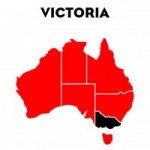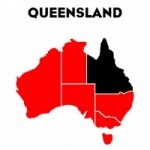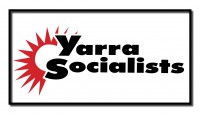What is Democratic Centralism? A speech by Samantha Ashby delivered at the SP Summer School February 2005.
For those who dont know what democratic centralism is it is the way that a revolutionary party organizes. The Socialist Party organizes and makes decisions using these methods.
But it?s more than an organizational question, the methods of democratic centralism flow from the key political task that the revolutionary party faces , namely the overthrow capitalism.
James Canon wrote about democratic centralism in ?The Struggle for a Proletarian Party?. He discussed the role of a revolutionary party and democratic centralism. Cannon makes it clear that a revolutionary Marxist party has a definite program, which aims to organize the working class in the struggle for power and the transformation of the existing social order [capitalism].
All of the party?s activities, its methods, and its internal regimes are subordinated to this aim and are designed to serve it .
Canon stated that ?The Party needs a Self-acting, critical minded membership with collective thought, discussion, experience. It needs the widest party democracy in the ranks of the organization.? This is because ?the struggle for power organized and led by the revolutionary party is the most ruthless and irreconcilable struggle in all history?. ?A loosely knit, heterogeneous, undisciplined, untrained organization is utterly incapable of accomplishing such world-historical tasks as the proletariat and revolutionaries are faced with at the moment?.
As we enter into periods of struggle the need for an organized party increases. Canon stated that the need for leadership and centralized direction are indispensable prerequisites for any sustained and disciplined action, especially in a party that sets itself the aim of leading the collective efforts of the proletariat in its struggle against capitalism. Without a strong firm central committee (NC) having the power to act promptly and effectively in name of the party and to supervise and coordinate and direct all its activities without exception, the very idea of a revolutionary party is meaningless nonsense?.
Through the experience and history of working class struggle The Socialist Party have adopted the Leninist principle of organization called democratic centralism.
Experience in the class struggle has demonstrated that there are no absolute guarantees for the preservation of the principle of democratic centralism and no rigid formula that be set down in advance. Lenin realized that the problem of applying the method of democratic centralism to different political situations can only be resolved in relation to concrete situation, tests, and experiences through which the movement passes.
Under democratic centralism members, leaders and the party itself have rights and responsibilities. The leadership of the party must be under the control of the membership with its policies open to criticism, discussion, and rectification by the rank and file within the properly established forms and limits, and leading bodies themselves subject to formal recall or alteration.
Responsibility of the Membership
All members have definite rights, fullest freedom of discussion, debate, and criticism inside ranks of party, limited only by decisions and provisions made by the party. The members have the right of being democratically represented at all policy making assemblies of party from branch to national and international convention. And the rights of the final and decisive vote in determining the program, policies and leadership of the party.
The theoretical and political character of the party is determined by its program, it is what makes the revolutionary party different from all other parties. The obligations of party membership as Cannon stated are “The loyal acceptance of program of party, regular affiliate to one of the basic units, i.e. come to regular meetings. The acceptance of its discipline and carrying on of its activities in accordance with the program of the party, with decisions adopted by its conventions (conferences) and with policies formulated and directed by party leadership with 100% loyalty.”
The membership of a revolutionary party requires a minimum of activity in the organization as established by the proper unit. It requires the members to contribute materially to support of the organization in accordance with means (ie pay regular subscriptions that you can afford).
While building the movement in a disciplined way a revolutionary Marxist party opposes the undemocratic methods of the Stalinist bureaucracy, but is also against ?all inclusiveness? which experience has shown can parlayse the party and it?s ability to act.
Party Rights (James Cannon)
The party accepts people who agree with program and denies admissions to those who don?t. All inner party discussion must be organized from the point of view that the party is not a discussion club which debates endlessly on any and all questions without arriving at a binding decision that enables the organization to act.
Cannon also outlines that all discussions should start from the point of view that we are a disciplinary party of revolutionary action.
The Party in general has the right to organize discussions in accordance with the requirements of the situation ? there is a right to call irresponsible individuals to order and eject from party.
All decisions of national party conference are binding on all members without exception, and they conclude the discussion on all disputed questions upon which a decision has been taken. Any member violating the decision of conference or attempting to revive discussions in regard to them within any formal organization of the party and puts themselves in opposition to the party and forfeits rights of membership all party organizations are authorized to enforce this.
The reason democratic centralism and its method of organizing the leadership is so important is because Revolutionary opportunities are few and far between they don?t last forever. We need to be able to lead a revolutionary movement. To do this we need a developed political leadership at national ?regional and local levels.
We need a consistent and developed cadre so that opportunities that present themselves can be grasped. The process of Democratic centralism is vital to this development and requires a thorough accountability to hold the leadership in check.
Democratic centralism means maximum discussion in debate and maximum unity in action. This means that a small revolutionary party can have an impact far beyond its numbers because the ideas it puts forward correspond to the mood of the masses. All Action is done is a united way. This massively increases the impact that one individual member can have on how a party acts in day to day actions and can help changes in direction.
For example, during the struggle against the Poll Tax in the UK, the British leadership discussed our program a year before the Poll Tax was brought in. The British leadership came up with the method of organized maximum non-payment .It was discussed at all party bodies that is all branches and aggregates. The idea of mass non payment was laughed at by our opponents.
The political idea of mass non-payment came from the national leadership and was discussed thoroughly at the branches. It was based on the Leaderships? political experience and analysis of other historical and international examples of non-payment ? i.e. rent strikes in Clyde in Glasgow. But most importantly, it was the ability for the political and organizational experiences of the members to be swiftly passed throughout the organization and in turn throughout the whole anti-poll tax campaign that made the campaign so successful.
The Political leadership of the Socialist Party is held accountable by the membership ? the balance of democracy and centralism changes so that if swift action is required decisions are taken by leadership ? but are discussed at all levels and corrected if necessary. A key method is developing political teams and accountability. Because teams are so important it?s why the National Committee of the Socialist Party is elected by our national conference and why it?s elected as a slate . A slate means that a team of comrades is put forward for election by the membership rather than a series of individuals . Members are able to move any alternate slate if they feel it would provide a better national team. The Conference is a revolutionary party?s highest body because it has the greatest representation of membership. Accountability and teamwork are the reasons why it?s the National Committee?s responsibility to carry out the job that it was elected to do by conference.
As a norm the National Committee occurs with just the members of the National Committee present i.e. it is traditionally closed. Traditionally NCs are closed because it gives the NC members the time to discuss points fully and NC members need to be seen as leaders of the organization. The program of the party is vital to our success in the fight against capitalism and for this reason the political positions of NC need to be fully developed. By being closed the NC members have time to develop political points through thorough discussion and are able to come into discussion, If need be several times, until points are fully developed. This enables the NC to properly develop the Party?s Program, strategy and tactics and campaigns.
Reports of the National Committee are provided to all members at branch meetings so that all members know what is happening and why. The NC can co-opt people if needed and can invite people along who have specific expertise, for example for trade Union discussions. All Leaders are held accountable through the NC reports and branches sending resolutions to NC, and also through Day to day discussion with rank and file members.
Ultimately the NC members are responsible to conference. [If need be a recall conference of the national membership can be called to elect a new NC if that is thought necessary].
The next level of leadership, the National Secretariat is appointed by NC to oversee business on at least a weekly basis between national committees which occur monthly. The members of the National Secretariat are accountable to the NC in the same way that NC is accountable to conference. In the same way that the NC takes decisions between national conferences ? the EC takes decisions between NCs. This makes decision making quick, flexible and accountable.
One of the aims of democratic centralism is to develop a national leadership and in turn a regional leadership. It allows the full development of rank and file members through political education which occurs at branches. It is why Political points and ideas are always brought back to the branches where they are discussed thoroughly. It is also why all members are encouraged and expected to contribute politically to all discussions and for even newer comrades to lead meeting discussions (with support and assistance from more experienced cadres).
NC members feedback to branches on issues such as recruitment, Paper sales. And these are mirrored in branch responsibility. So when members vote for a resolution at conference following opportunity to debate the issues whether the vote is lost or won as party members we carry out the decision. If questions arise in debates they can be discussed in branches and passed via resolutions brought to the NC. Here they can be discussed in full by the party?s leading members.
The role of revolutionary Party
The methods of democratic centralism are linked with the role of a revolutionary party. Lenin discussed the role of revolutionary Party ? in ?What is to be Done?? As revolutionaries ?this movement imposes this duty upon us because the spontaneous struggle of the proletariat will not become its genuine class struggle until this struggle is led by a strong organization of revolution.? The energy and ferment of revolutionary situation is often compared to steam. Without a revolutionary party steam disappears. Whereas revolutionary party can be seen to be like a piston that captures and directs this energy. There have been many revolutionary movements where workers have been determined to carry out the abolition of capitalism, but there?s only been one successful led by workers in Russia 1917. That was led by the Boshevik party.
Lenin stated that a revolutionary party has the task of reorganizing the whole system of production and distribution on a more dignified and workable basis. The role of the party is agitation propaganda and organization. ?It?s necessary to help the masses in the process of daily struggle to find the bridge between present demands and the socialist program of the revolution. Trotsky realized that this should include a system of transitional demands. This means demands stemming from today?s consciousness of wider layers of working class and that inalterably leading to final conclusion ?conquest of power by the proletariat. The difference between a revolutionary party and a social democratic party is that they limit party work to reforms within frameworks of bourgeois society.
Because of his experiences and those of the Bolsheviks in the struggle to overthrow the ruling class ? Lenin realized that the revolutionary party needs to organize on strong centralist lines, where the emphasis is on the democracy in democratic centralism and democratic rights of membership. After 1905, Lenin proposed democratizing all the Bolshevik party?s, structures and methods. This method led to his statement that the ?the St Petersburg worker social-democrats know that the whole party organization is now built on a democratic basis. This means that all the party members discuss and decide questions concerning the political campaigns of the proletariat and that all the party members determine the line and tactics of the party organizations.? Even then he stated that ?there needs to be work done to make the local organizations the principal organizational units of the party in fact and merely in name, to see that all the high or standing bodies and elected accountable and subject to recall.? This process in Russia brought greater autonomy for regional sections as it ?implies universal and full freedom to criticize so long as this does not disturb the unity of a definite actions; it rules out all criticism which disrupts or makes difficult the unity of an action decided on by the party?.
Lenin stated that ?the Role of the Revolutionary Party is to draw masses of workers, into intelligent decision of party questions discussed in the press, at meetings, in circles and at group meetings.? With ?Our duty ? to assist every capable worker to become a professional agitator, organizer, propagandist, literature distributor etc. It is important to develop as many worker-agitators as possible.? This involves involving all the membership in free and open political debates and discussions at branch level.
In summary
Democratic centralism is the method by which revolutionary parties are organized. It is a method of organization that flows from the very task that the revolutionary party sets itself namely the overthrow of capitalism. Its mechanisms mean that each member in the Socialist Party can impact on the leadership. It is the democracy of accountability of each member including the leadership. It means that the Socialist Party organizes and acts in a democratic manner.
It means as members of the Socialist Party we act for the party and not as individuals. Each member should take part in political discussion and put forward ideas. These ideas can be discussed at branch meetings and in resolutions to branch meetings. If you win the argument at branch a resolution goes for discussion at the NC, or if more suitable, can be put to the national conference. It is a workers? democracy with collective democracy ? not individualistic.
As Cannon stated the membership has to demand and expect the greatest responsibility from the leaders because of the position they occupy in the movement. Selection of cadres to positions of leadership means conferring of extraordinary responsibility. Warrant must be proved continuously. Leaders need to have devotion, sacrifice, and complete identification with partly itself and its daily life and action. They need the ability to defend policies before the membership and defend line of the party as a whole to the working class.

























































